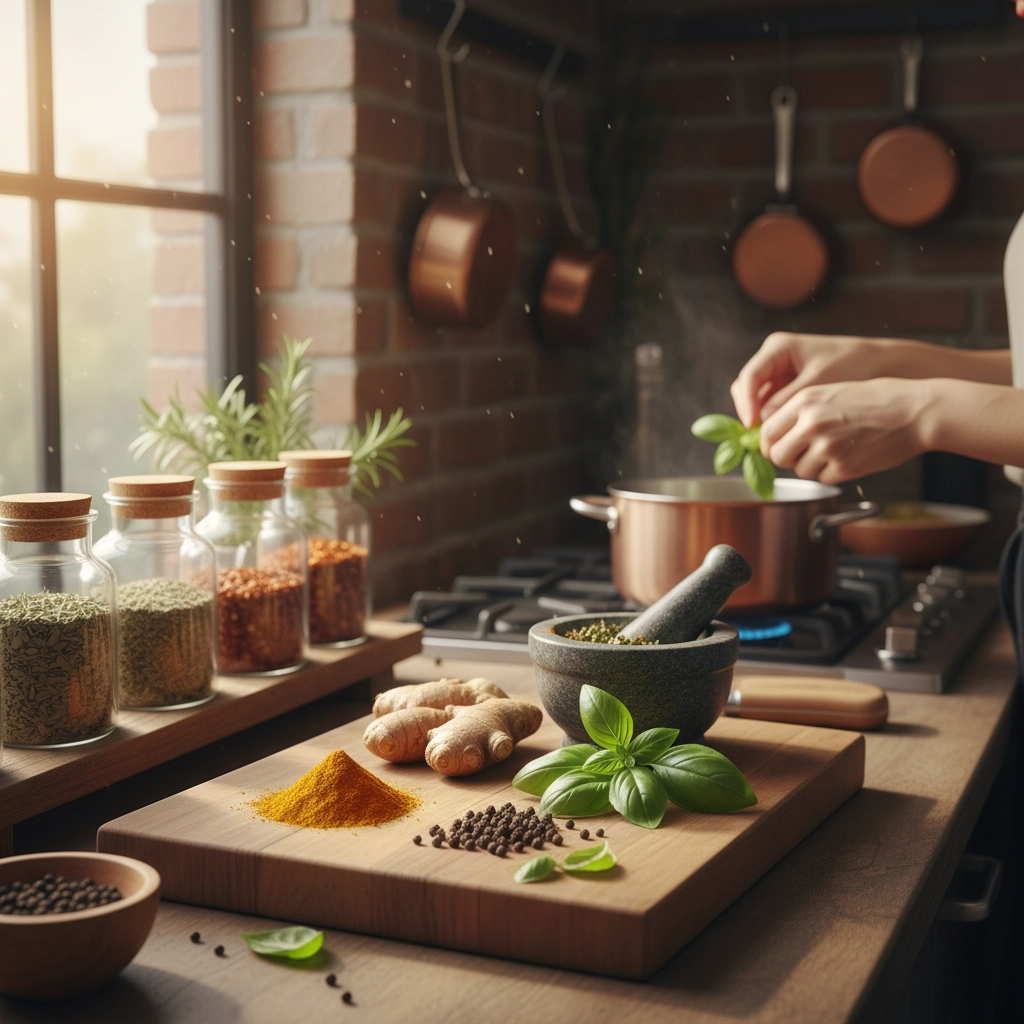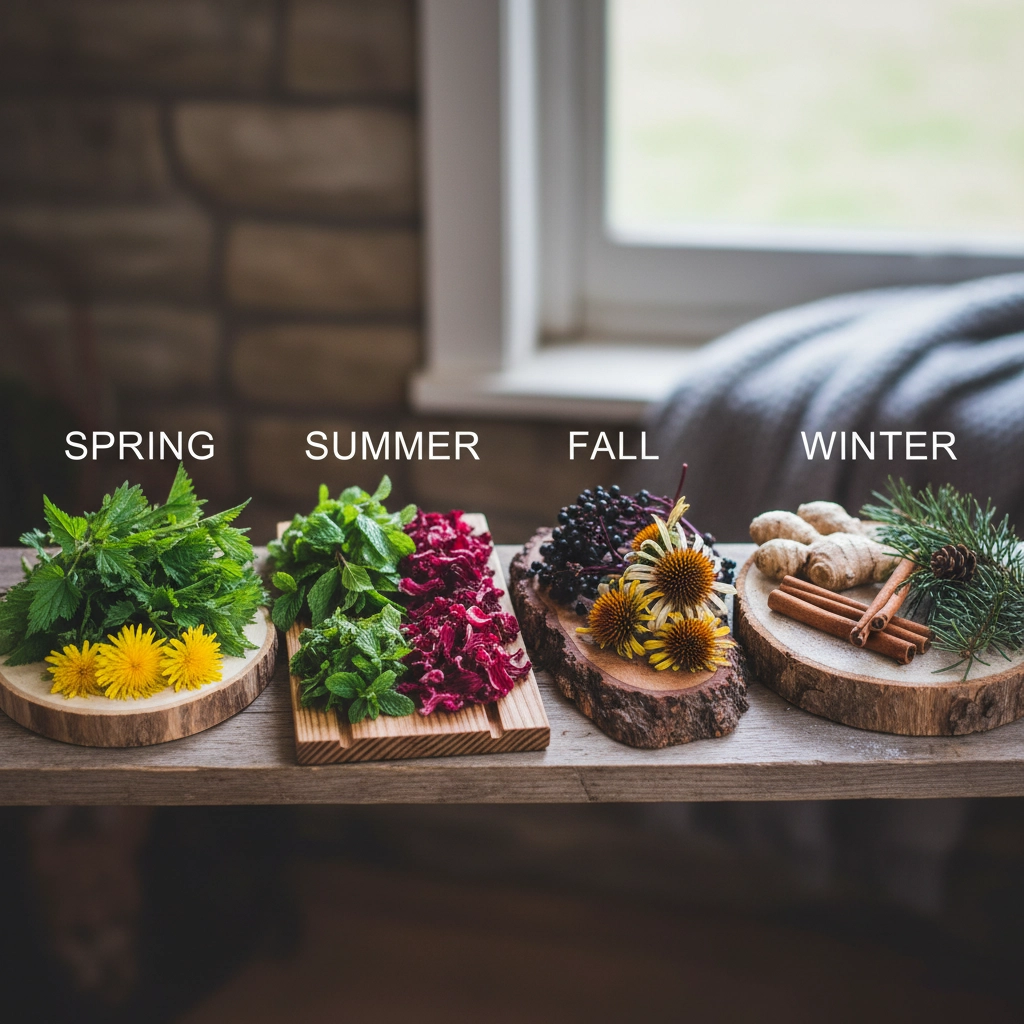Herbal medicine doesn't have to feel complicated or intimidating. In fact, you're probably already using it more than you realize: that ginger tea when your stomach feels off, the aloe plant you reach for after too much sun, or the chamomile you sip before bed. The beauty of herbal medicine lies in its simplicity and accessibility. You don't need a degree in herbalism to start experiencing the gentle, supportive benefits of plants in your daily life.
Start Your Morning with Intention
Your morning routine is the perfect place to begin integrating herbal medicine. Instead of reaching for that second cup of coffee, try an energizing herbal tea blend. Peppermint can wake up your digestive system, ginger adds warmth and circulation support, and a pinch of ginseng root can provide sustained energy without the crash.

Creating herbal teas is wonderfully simple: just steep fresh or dried herbs in hot water for 5-10 minutes, strain, and enjoy. Start with single herbs to understand their individual effects, then experiment with blends that appeal to your taste buds and wellness goals.
Transform Your Kitchen Into an Herbal Pharmacy
Your spice rack is already a mini herbal pharmacy waiting to be activated. Turmeric, that golden powder sitting in your cabinet, is one of nature's most powerful anti-inflammatory herbs. Try adding a pinch to your morning smoothie along with black pepper (which helps your body absorb turmeric's beneficial compounds) and ginger for digestive support.
Fresh herbs from your garden or grocery store can easily transform ordinary meals into medicine. Basil isn't just for pasta: it's also a natural mood elevator and stress reducer. Rosemary supports circulation and mental clarity. Oregano packs antimicrobial properties that support immune health. When you season your food with intention, every meal becomes an opportunity for healing.

Discover the Magic of Oxymels
One of the most overlooked yet incredibly effective ways to integrate herbal medicine is through oxymels: traditional preparations that combine herbs with honey and vinegar. These sweet-and-sour remedies have been used for centuries and offer a delicious way to take your herbs daily.
Making an oxymel is surprisingly simple. Combine equal parts raw honey and apple cider vinegar, then add your chosen herbs. Fire cider is probably the most famous oxymel: a spicy blend typically containing horseradish, ginger, onion, garlic, and hot peppers that supports immune function and circulation. But you can create gentler versions too.
Try a digestive oxymel with fresh ginger, fennel seeds, and lemon balm. Or create a calming evening oxymel with chamomile, lavender, and rose petals. Take a tablespoon straight or dilute it in sparkling water for a refreshing herbal drink. The honey provides sustained energy while the vinegar helps extract the herbs' beneficial compounds and supports digestive health.
Create Healing Rituals Through Topical Applications
Your skin is your body's largest organ, making topical herbal applications incredibly effective. Herbal baths transform your evening routine into a therapeutic ritual. Simply fill a muslin bag or old sock with dried herbs like lavender for relaxation, eucalyptus for respiratory support, or chamomile for skin soothing, then let it steep in your hot bathwater.

Don't have a bathtub? Foot soaks work wonderfully too. After a long day, soak your feet in a basin of hot water infused with peppermint for cooling relief or ginger for warming circulation support. Even a simple steam facial with herbs like rose petals or green tea can provide both relaxation and skin benefits.
Embrace the Evening Wind-Down
Your evening routine offers another beautiful opportunity for herbal integration. Create an evening tea ritual that signals to your body it's time to slow down. This isn't just about the herbs themselves: though calming plants like chamomile, lemon balm, passionflower, and milky oat tops are incredibly supportive: it's about creating a moment of pause in your day.
The simple act of preparing tea, holding a warm mug, and sitting quietly for 15 minutes provides mental and physical benefits beyond the herbs themselves. You're training your nervous system to shift from the day's activity into rest mode, supporting healthy sleep patterns naturally.
Master Simple Preparations
Tinctures might sound intimidating, but they're actually one of the most convenient ways to use herbs consistently. These concentrated liquid extracts can be purchased ready-made or prepared at home by soaking herbs in alcohol for several weeks. A few drops under the tongue or mixed into water provides concentrated herbal support that travels with you anywhere.
For those avoiding alcohol, glycerites use vegetable glycerin instead and offer a sweet, mild alternative that's especially good for children or sensitive individuals.

Build Sustainable Habits
The key to successful herbal integration is starting small and staying consistent. Choose one method that appeals to you and practice it for a few weeks before adding another. Maybe you begin with a morning herbal tea, then add an evening oxymel, followed by weekly herbal baths.
Pay attention to how different herbs affect you personally. Everyone's body responds differently, and part of the journey is discovering which plants resonate with your unique constitution. Keep a simple journal noting what you try and how you feel: this helps you identify patterns and build your personal herbal toolkit.
Seasonal Awareness
Let the seasons guide your herbal choices. Spring herbs like nettle and dandelion support the body's natural detoxification processes. Summer cooling herbs like peppermint and hibiscus help you stay comfortable in heat. Fall immune-supporting herbs like elderberry and echinacea prepare you for colder months. Winter warming herbs like ginger, cinnamon, and pine needles provide comfort and circulation support.
This seasonal approach keeps your herbal practice fresh and aligned with your body's changing needs throughout the year.
Safety and Common Sense
While herbs are generally gentle and safe, they're still medicine and deserve respect. Start with small amounts to see how your body responds. If you're pregnant, nursing, or taking medications, consult with a healthcare provider familiar with herbal medicine. Research any herbs you're unfamiliar with, and trust your instincts: if something doesn't feel right, discontinue use.
Quality matters too. Choose organic herbs when possible, source from reputable suppliers, and store your herbs properly to maintain their potency.
Your Herbal Journey Begins Now
Integrating herbal medicine into your life doesn't require dramatic changes or expensive equipment. It's about developing a deeper relationship with the plant world and recognizing the healing potential that surrounds us daily. Start where you are, with what you have, and let curiosity be your guide.
Whether you begin with a simple morning tea, experiment with kitchen herb seasonings, or dive into making your first oxymel, remember that every small step builds toward a more natural, connected way of living. Your body: and your well-being( will thank you for it.)





